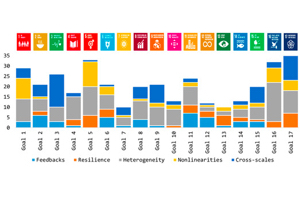Odirilwe Selomane and colleagues analyzed the SDGs in relation to five key features of social-ecological systems: social-ecological feedbacks, resilience, heterogeneity, nonlinearity, and cross-scale dynamics. They discover that while the SDGs were designed with a systems approach in mind, the indicators used to monitor the SDGs fall short of fully engaging with complex adaptive systems concepts and insights. They contend that SES research can inform the future development of monitoring progress towards achieving the SDGs.
Two challenges highlighted by Selomane et al. are that firstly, monitoring micro-level components or properties may miss important interactions that give rise to emergent behaviour at a macro level. Secondly, a "systems" approach is not the same as a "complex adaptive systems" approach. The latter involves key features mentioned above, that can help inform a more integrated approach to SDG monitoring that accounts for system dynamics and complexity in ways that are relevant to sustainability outcomes.
Selomane, O., B. Reyers, R. Biggs, and M. Hamann 2019. Harnessing Insights from Social-Ecological Systems Research for Monitoring Sustainable Development. Sustainability 11, 1190; doi:10.3390/su11041190
Link to paper: https://www.mdpi.com/2071-1050/11/4/1190

Keywords: SDGs, SES, social-ecological systems, complex adaptive systems, monitoring